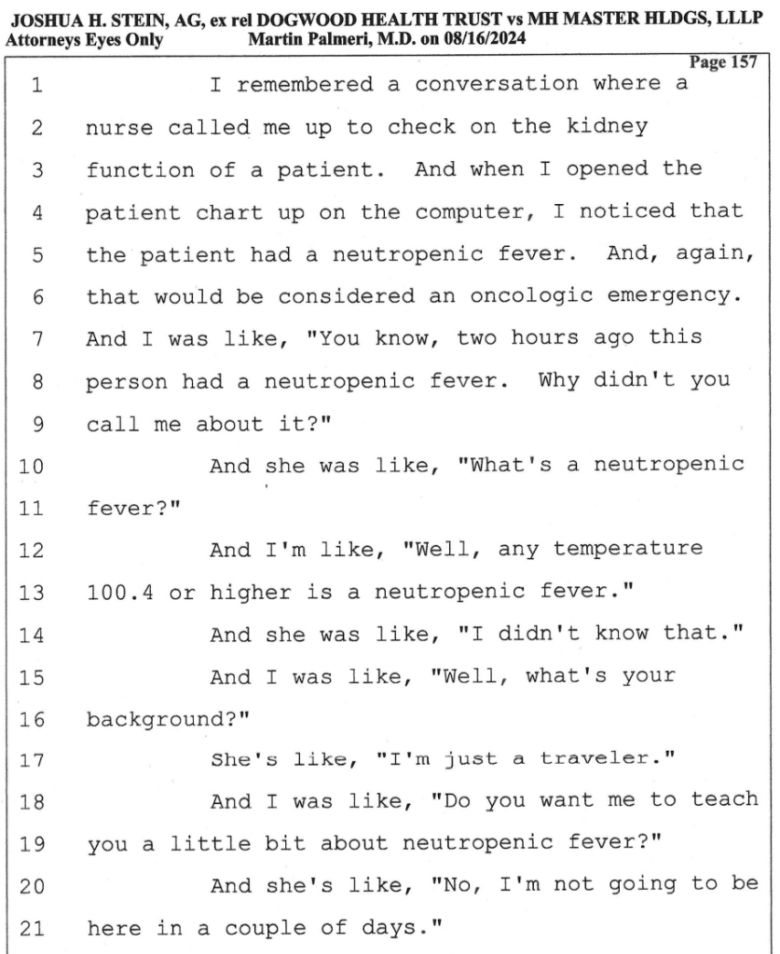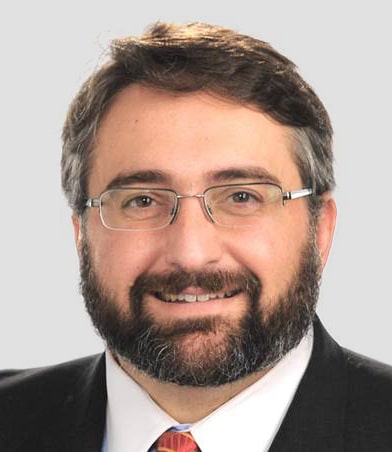The cancer patients on floor K9 were among the sickest at Mission Hospital, in need of close monitoring.
Dr. Martin Palmeri, an oncologist at Messino Cancer Centers, already had grave concerns about the quality of care under HCA Healthcare’s ownership when he received a call about a patient.
The nurse wanted to check on the patient’s kidney function but when Palmeri opened their chart he noticed a potentially life-threatening development: a neutropenic fever had been documented two hours earlier.
“That would be considered an oncologic emergency,” Palmeri testified in an August 2024 deposition. “And I was like…’Why didn’t you call me about it?’”
“And she was like, ‘What’s a neutropenic fever?’”
Palmeri said he explained and the nurse responded, “I didn’t know that… I’m just a traveler.’”
Palmeri said he offered to educate the nurse about the condition but she responded, “‘No, I’m not going to be here in a couple of days.’”
Excerpts from Palmeri’s deposition were included in a recent court filing by North Carolina Attorney General Jeff Jackson in a lawsuit against HCA alleging the company broke its commitments to continue oncology and other services at Mission after it purchased the hospital system in 2019.
HCA has not responded to the filing, and neither its lawyers nor hospital spokeswoman Nancy Lindell replied to a request for comment from Asheville Watchdog.
The case centers on a provision of the asset purchase agreement (APA) that detailed the terms of the $1.5 billion sale of the nonprofit Mission Health system. The APA states HCA “shall not discontinue the provision” of services including behavioral health, cardiology, emergency and trauma, obstetrics, surgery, oncology and pediatrics at Mission for 10 years.
 An excerpt from oncologist Martin Palmeri’s August 2024 deposition that was included in a recent court filing by North Carolina Attorney General Jeff Jackson in the state’s lawsuit against HCA.
An excerpt from oncologist Martin Palmeri’s August 2024 deposition that was included in a recent court filing by North Carolina Attorney General Jeff Jackson in the state’s lawsuit against HCA.
HCA has denied that it violated the agreement and argued that it never promised to provide quality health care. Its lawyers wrote in a court filing that the APA was “silent as to the quantity or quality of services required.”
HCA also has argued in court that the words “shall not discontinue” mean the company is merely obligated to provide “the facilities and ancillary staff necessary for providers who choose to use the hospital to care for their patients.”
By that interpretation,“all it must do is keep its hospital doors unlocked and offer ancillary staff — whether or not Mission actually provides care to patients,” the attorney general’s office wrote in an Oct. 27 brief.
HCA clearly breached the APA’s requirement for oncology services, Jackson’s brief states. By the end of 2023, “HCA had zero medical oncologists on staff at Mission to supervise initial chemotherapy treatments and provide inpatient complex hematology services.”
Hospital care compromised patients, Palmeri testifies
Oncologists became increasingly concerned about the care their patients were receiving and tried to work within internal channels at Mission, Palmeri testified in his deposition.
They filed “vigilance reports” about patient incidents with the hospital’s quality improvement committee to “try to find some methodology to make sure it doesn’t happen again,” Palmeri said.
 “We felt that HCA’s leadership was not capable of competently running K9, and that led to the vote,” oncologist Martin Palmeri said in his deposition, explaining why oncologists at Mission took a vote of no confidence in the hospital’s management in 2022. // Credit: Messino Cancer Centers
“We felt that HCA’s leadership was not capable of competently running K9, and that led to the vote,” oncologist Martin Palmeri said in his deposition, explaining why oncologists at Mission took a vote of no confidence in the hospital’s management in 2022. // Credit: Messino Cancer Centers
“For the first couple of years we were filing many, many reports, and we just weren’t getting feedback on those,” he said. “We were finding that there were lots of examples of missed care that was compromising our patients.”
In 2022, oncologists at Mission took a vote of no confidence in the hospital’s management. “We felt that HCA’s leadership was not capable of competently running K9, and that led to the vote,” Palmeri said in his deposition.
Patients on the floor had complex needs and cancers such as acute leukemia and lymphomas.
“These are very, very sick people,” Palmeri said. “They often require very skilled nurses, very attentive nurses.”
Oncology nursing guidelines called for three to four patients per nurse, but nurses at Mission were each caring for six to seven patients, he said.
“We were finding that the nurses not necessarily do things wrong, but the nurses were definitely missing things,” Palmeri said. “The fact the nursing ratios were too high, a lot of the nurses began to quit…They were refilling the ranks with nurses that didn’t have any experience in oncology.”
Palmeri testified that nurses “were not checking temperature in the time frames that they’re supposed to check.”
Exodus of oncologists
Cancer patients undergoing treatments such as chemotherapy often have neutropenia, low levels of a type of white blood cell that make them susceptible to infection.
“A patient who is considered neutropenic, if they spike a low-grade temperature of 100.4, they can go from being alive and well to dead in three hours,” Palmeri said.
In September 2023, oncologists at Messino said they would no longer treat acute hematology cancer patients at the hospital due to “ongoing system failures,” Palmeri wrote in a letter announcing the decision.
“There had been an ongoing discussion, probably going back nine months from when that letter was written, talking about, is the hospital still a safe place to deliver complex hematologic care?” Palmeri said in his deposition. “This had been brought up on numerous occasions in the months preceding the actual announcement.”
Messino once provided the oncologists at Mission under a professional agreement, but it ended in 2019 after the sale. Some Messino doctors continued to provide acute hematology care until the September 2023 announcement.
 Messino Cancer Centers once provided the oncologists at Mission under a professional agreement, but it ended in 2019 after the sale. Some Messino doctors continued to provide acute hematology care until the September 2023 announcement. // Watchdog file photo by Starr Sariego
Messino Cancer Centers once provided the oncologists at Mission under a professional agreement, but it ended in 2019 after the sale. Some Messino doctors continued to provide acute hematology care until the September 2023 announcement. // Watchdog file photo by Starr Sariego
HCA started its own practice, Mission Medical Oncology, when Messino’s 2019 agreement ended and planned to hire 13 doctors plus nurses and support staff, according to the attorney general’s brief last month.
While HCA “successfully hired five well trained oncologists,” the medical director of the practice from 2020 to 2023 stated it was “unable to retain these oncologists due to unresolved practice issues at Mission Hospital,” according to the brief.
In 2021, the Mission oncologists began leaving and by November 2023, there were none.
“This discontinuance of services constitutes a breach” of the purchase agreement, the attorney general brief states.
Lindell, the Mission spokeswoman, did not respond to questions about whether Mission had replaced the oncologists, how many it currently had or whether the hospital was providing complex hematology care.
Consulting a dictionary
The lawsuit, filed in December 2023 by Jackson’s predecessor and now-Gov. Josh Stein, followed an attorney general investigation and numerous complaints from medical staff, patients and elected officials about a decline in care after the sale. The lawsuit seeks to require HCA to restore emergency and trauma care and oncology services to pre-sale levels.
The case could hinge on the meaning of three words in the purchase agreement: “shall not discontinue.”
 In December 2023, then-North Carolina Attorney General Josh Stein announced that his office was suing HCA Healthcare, alleging the company broke its commitments to continue oncology and other services at Mission after it purchased the hospital system in 2019. // Watchdog file photo by Andrew R. Jones
In December 2023, then-North Carolina Attorney General Josh Stein announced that his office was suing HCA Healthcare, alleging the company broke its commitments to continue oncology and other services at Mission after it purchased the hospital system in 2019. // Watchdog file photo by Andrew R. Jones
HCA previously sought a partial summary judgment, a legal ruling by a judge without a trial, “on the proper textual construction of” the phrase, according to an April court order.
Both sides consulted Merriam-Webster. HCA relied on “several dictionary definitions” of discontinue to support its position and said that “the Attorney General is attempting to add quality and volume metrics that were not negotiated,” the order states.
It said the attorney general focused on the definition “to break the continuity of” and argued “that even a gap or temporary break in a service constitutes a discontinuation of that service for the patient impacted.”
Julianna Theall Earp, Special Superior Court Judge for complex business cases, ruled April 16 that not only was the phrase “shall not continue” ambiguous but “also that the word ‘services’ lacks clarity.”
“For example, does a discontinuation of chemotherapy under ‘oncology services’ mean a cessation of all types of chemotherapy, or is it enough to stop providing one type of chemotherapy?” the judge wrote. “Does it mean that the service stops for all current and prospective patients, or is it enough for a single patient to experience a discontinuation of treatment?
“Additional evidence is needed,” the judge wrote, “to determine the parties’ intent.”
Attorney general: No support for HCA’s ‘litigation theory’
Additional evidence is now in, the attorney general’s office wrote in its brief, and it shows “that the parties always understood [the APA] as a commitment to continuously provide the services available at Mission at the time of the sale.”
Among the evidence the attorney general cited:
A March 2018 term sheet for the sale that said, “HCA will not discontinue the provision of any of the health care services provided as of the Closing at the Mission Hospital Campus Facilities.”
Emails between Mission’s then-President and CEO Ron Paulus and HCA’s lawyer, Chuck Hall, beginning in August 2018 saying the Mission board needed to ensure “that the services available today at Mission Hospital are going to be here for at least 10 years.”
A follow-up email in which Paulus, who had been authorized to negotiate for the hospital board, wrote in bold that he “ha[d] to have some reference to services being generally consistent with those services provided as of signing.”
A January 2019 resolution by the Mission board that listed principal factors for approving the sale, including that “HCA made contractual commitments to maintain services and facilities throughout western North Carolina that were far beyond what the Mission Board believed that Mission could make to its patients and staff were it to remain independent.”
HCA’s internal documents reflected similar language, the attorney general contends. Included with the court filing are HCA spreadsheets circulated among senior leadership, such as one in August 2019 titled, “NC Division Post-Close Commitment Checklist,” that includes a requirement to “continue services currently provided at Mission’s primary Asheville hospital .. . for 10 years.”
On internal HCA audit forms, signed every year after the sale, Mission’s CEO attested that the services under the APA were “continuously offered.”
“Collectively, there is now uncontroverted material evidence” that all parties understood the APA required HCA to continuously provide “services that were available at Mission at the time of the transaction,” the attorney general’s brief states. “In contrast, the evidence offers no support for HCA’s litigation theory” that the agreement was “nothing more than a promise to keep Mission’s facilities open and provide ancillary staff to physicians who may wish to provide services.”
The expectation from the sale of Mission, the attorney general contends, was not just that HCA would continue its level of care but build on it.
“Ideally, HCA would do more than just maintain services – it would expand them beyond pre-sale Mission’s capacity. But if not, the people of western North Carolina would at least be able to count on a continuation of the status quo: the provision of high-quality emergency and trauma and oncology services as available at the time of sale.”
Asheville Watchdog welcomes thoughtful reader comments about this story, which has been republished on our Facebook page. Please submit your comments there.
Asheville Watchdog is a nonprofit news team producing stories that matter to Asheville and Buncombe County. Sally Kestin is a Pulitzer Prize-winning investigative reporter. Email skestin@avlwatchdog.org. The Watchdog’s reporting is made possible by donations from the community. To show your support for this vital public service go to avlwatchdog.org/support-our-publication/.
Related

